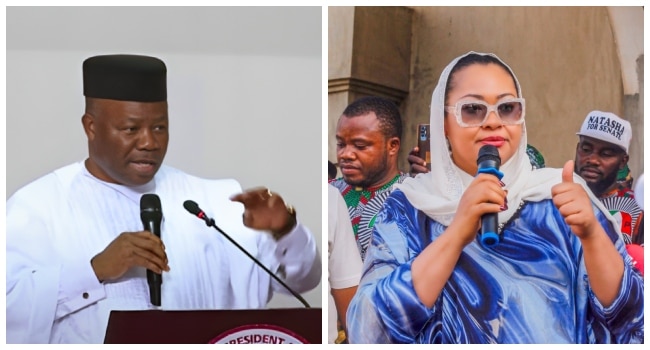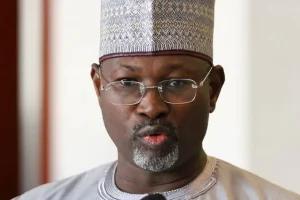
Senator Natasha Akpoti-Uduaghan, who represents Kogi Central in the National Assembly, has strongly declined a proposed out-of-court settlement put forward by the legal team of Senate President Godswill Akpabio.
The proposal, led by senior advocate Olisa Agbakoba (SAN), was in response to Akpoti-Uduaghan’s recent accusations of sexual harassment against Akpabio.
In a recent interview with The Nation, Senator Akpoti-Uduaghan reaffirmed her determination to pursue legal redress, stating that the gravity of her allegations warranted a full and transparent judicial process not a private resolution behind closed doors.
“An out-of-court settlement? Settle what, exactly? What about how I felt?” she asked, visibly emotional. “This isn’t just about me, it’s about standing up against intimidation and injustice. I am not seeking to settle anything quietly. I want accountability.”
The senator insisted that her refusal was rooted in the principle of justice, not personal vengeance. “This is not about compromise. It’s about making sure no woman suffers in silence or gets silenced when she speaks out,” she added.
Akpoti-Uduaghan also criticized what she described as the negative political signals being sent by Akpabio’s handling of the situation, saying his refusal to voluntarily submit to investigation reflects poorly on the administration of President Bola Tinubu. “Akpabio should welcome a proper investigation if he has nothing to hide,” she said.
Agbakoba Challenges Validity of Claims
In response, Akpabio’s legal counsel, Olisa Agbakoba, urged the senator to present more substantial evidence to support her claims, which he argued did not yet meet the legal threshold for a proven case of sexual harassment. According to Agbakoba, inconsistencies in Akpoti-Uduaghan’s narrative raise serious questions.
He specifically highlighted a sequence of events that appeared contradictory: “The senator made the allegations on December 8, 2023, yet posted messages on social media praising Senator Akpabio during his birthday celebration in Uyo on December 9,” he stated. “How do we reconcile that with the claims now being made?”
Agbakoba maintained that while the possibility of harassment cannot be dismissed outright, it is critical that such allegations are examined with due diligence. “Sexual harassment takes many forms—it could be verbal, physical, or behavioral—but based on available information, I doubt there was any clear physical misconduct,” he said.
He further warned against the potential misuse of harassment claims as tools of political vendetta. “Allegations should be made and evaluated responsibly. We must avoid using sensitive issues as weapons of revenge,” he said, urging a careful and fair investigation into the matter.
A Case That Raises Broader Questions
The standoff between Senator Akpoti-Uduaghan and Senate President Akpabio now underscores deeper concerns about how sexual harassment cases are handled in Nigeria’s political space. The tension between seeking justice and maintaining political decorum is being tested in real-time, with the public watching closely.
While Akpoti-Uduaghan remains firm in her resolve to seek justice through the courts, Agbakoba’s call for more proof introduces a legal hurdle that could determine whether the case advances or falters.
At the heart of the issue is a broader societal question: how should allegations of misconduct be approached when they involve individuals at the highest levels of government?





